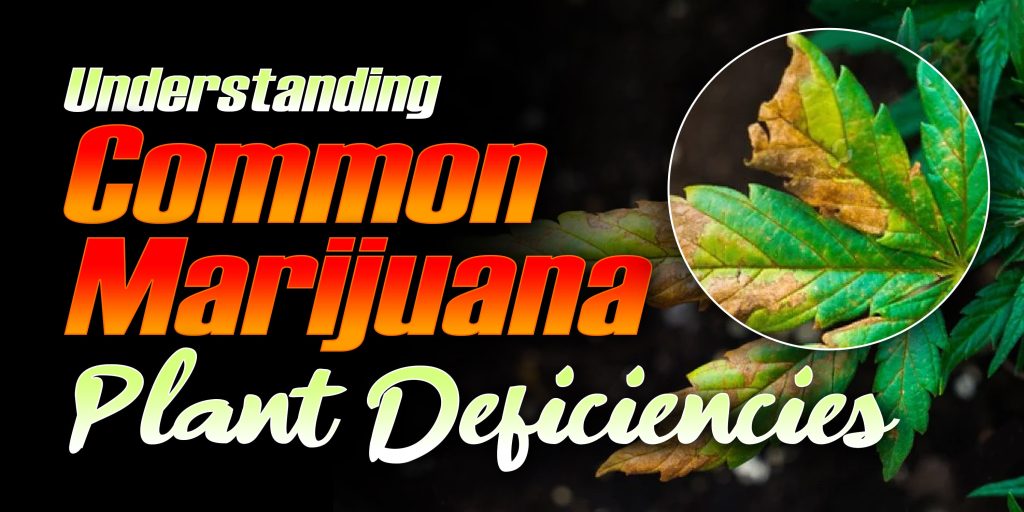

Cultivating marijuana, whether for recreational or medicinal purposes, demands attention to detail and care. One of the crucial aspects of successful cannabis cultivation is understanding and addressing plant deficiencies. Commonly referred to as weed deficiencies or pot plant deficiencies, these issues arise when cannabis plants lack essential nutrients or face environmental challenges. In this comprehensive guide, we’ll explore various marijuana plant deficiencies, their causes, symptoms, and effective remedies to ensure healthy and thriving cannabis crops.
Nutrient deficiencies in cannabis plants can hinder growth and compromise the quality of buds. Among the most common deficiencies are Nitrogen, Phosphorus, and Potassium.
Nitrogen Deficiency
Symptoms: Yellowing of lower leaves, stunted growth, overall pale appearance.
Causes: Poor soil quality, pH imbalance, overwatering.
Remedies: Use nitrogen-rich fertilizers, adjust pH levels, ensure proper drainage.
Phosphorus Deficiency
Symptoms: Dark green or purple leaves, slow growth, weak stems.
Causes: Imbalanced soil pH, insufficient phosphorus in soil.
Remedies: Use phosphorus-rich fertilizers, maintain optimal pH levels, avoid over-fertilizing.
Potassium Deficiency
Symptoms: Yellowing or browning of leaf edges, weak stems, reduced flower production.
Causes: Poor soil quality, overwatering, pH imbalance.
Remedies: Apply potassium-rich fertilizers, monitor soil moisture levels, adjust pH as needed.
To address these deficiencies, growers can utilize balanced fertilizers tailored to the specific needs of cannabis plants. Additionally, maintaining proper pH levels in the soil or growing medium is crucial for optimal nutrient uptake.
Factors Contributing to Nutrient Deficiencies in Marijuana Plants
Poor Soil Quality: Insufficient nutrients or imbalanced pH levels can hinder nutrient absorption by the plant roots, leading to deficiencies.
– Soil lacking essential nutrients or having pH levels outside the optimal range can impair the plant’s ability to uptake nutrients, resulting in deficiencies.
Overwatering or Underwatering: Excessive or inadequate watering practices can affect root health and soil aeration, disrupting nutrient uptake.
– Overwatering leads to waterlogged soil, which can suffocate roots and impede nutrient absorption, while underwatering can cause drought stress, limiting nutrient uptake.
Improper Fertilization Practices: Using the wrong type or excessive amounts of fertilizer can create nutrient imbalances and deficiencies.
– Incorrect application of fertilizers can overwhelm the plant with certain nutrients while neglecting others, leading to deficiencies or toxicities.
Light Deprivation: Inadequate light exposure can hinder photosynthesis and nutrient metabolism, resulting in weakened plants and reduced yields.
-Insufficient light limits the plant’s ability to produce energy through photosynthesis, affecting its overall metabolic processes and nutrient utilization.
Suboptimal Growing Conditions: Environmental factors such as temperature, humidity, and airflow can influence nutrient uptake and plant health.
– Suboptimal conditions create stress for the plant, affecting its ability to absorb and utilize nutrients efficiently, leading to deficiencies.
This issue is commonly encountered in indoor cultivation setups where natural light is limited, or artificial lighting is improperly configured. To mitigate light deficiency, growers should ensure adequate light intensity and duration. Adjusting the distance between grow lights and plants, supplementing with additional lighting sources such as LED or HID lights, and optimizing light schedules can help promote healthy growth and maximize yields.
Stunted Growth: Insufficient nutrients can hinder the plant’s growth, resulting in smaller overall size and diminished vigor.
Leaf Discoloration: Deficiencies often manifest as changes in leaf color, such as yellowing, browning, or discoloration, indicating nutrient imbalances.
Reduced Flower Production: Nutrient-deprived plants may produce fewer flowers, leading to lower yields and diminished potency.
Weakened Immune System: Plants lacking essential nutrients are more susceptible to pests, diseases, and environmental stressors, compromising their ability to defend against pathogens and other threats.
Impaired Photosynthesis: Deficiencies can disrupt chlorophyll production and photosynthetic activity, reducing the plant’s ability to capture and utilize light energy for growth and development.
Understanding and addressing marijuana plant deficiencies are essential for successful cannabis cultivation. By familiarizing themselves with common cannabis deficiencies and their causes, growers can take proactive measures to prevent and remedy nutrient imbalances. Whether it’s nutrient deficiency, light deficiency, or environmental factors contributing to deficiencies, early detection and intervention are key to ensuring healthy and thriving cannabis plants. By implementing preventive measures and best practices, growers can optimize their yields and produce top-quality buds for both recreational and medicinal purposes. Therefore, growers must prioritize maintaining optimal nutrient levels, providing adequate lighting, and optimizing environmental conditions to ensure robust and healthy cannabis plants. By integrating these practices into their cultivation techniques, growers can cultivate thriving marijuana crops with optimal yields and potency.
1. What are common marijuana plant deficiencies?
Common deficiencies in marijuana plants include Nitrogen, Phosphorus, and Potassium deficiencies, which can hinder growth and compromise bud quality.
2. What are the symptoms of Nitrogen deficiency in cannabis plants?
Symptoms of Nitrogen deficiency include yellowing of lower leaves, stunted growth, and an overall pale appearance.
3. What contributes to nutrient deficiencies in marijuana plants?
Factors such as poor soil quality, overwatering or underwatering, and improper fertilization practices can lead to nutrient deficiencies in marijuana plants.
4. How does light deprivation affect cannabis plants?
Inadequate light exposure can hinder photosynthesis and nutrient metabolism, resulting in weakened plants and reduced yields.
5. What are the effects of marijuana plant deficiencies on plant health?
Effects of deficiencies include stunted growth, leaf discoloration, reduced flower production, weakened immune system, and impaired photosynthesis, ultimately compromising plant vitality and yield potential.
In the ever-evolving landscape of cannabis exploration, Jack Herer has ...
Within the cannabis realm, specific varieties have attained iconic status, ...
Bhang, deeply ingrained in Indian customs, stands as a time-honored ...
Shopping with us is 100% secure! We don’t keep personal details.
Important Links
Subscribe and Get 10% Off
Connect With Us